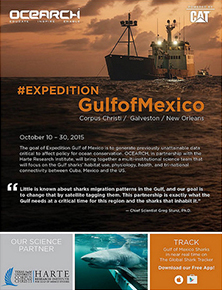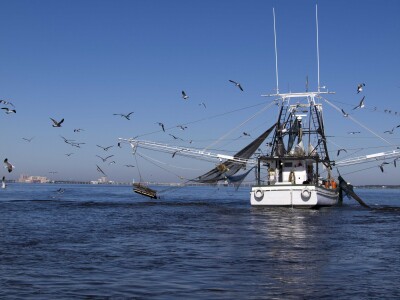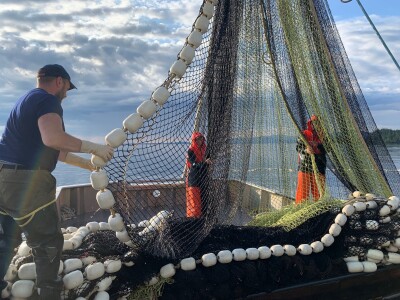The Harte Research Institute for Gulf of Mexico Studies at Texas A&M University-Corpus Christi is teaming up with leading shark-tracking nonprofit Ocearch to build the most extensive shark-tagging program in the Gulf of Mexico region.
In October, Ocearch is bringing its unique research vessel, the M/V Ocearch, to the gulf for a multi-species study to generate previously unattainable data on critical shark species, including hammerhead, tiger and mako sharks.
“Ocearch brings amazing capacity that allows us to greatly increase the numbers of sharks tagged in our region,” said Dr. Greg Stunz, HRI chair for fisheries and ocean health and director of the Center for Sportfish Science and Conservation. “We will have access to a world-class vessel and fishermen to locate and capture the sharks.“
Stunz says the Ocearch vessel is equipped with a lift system that safely lifts the shark from the water giving them unprecedented access to the animal.
“This method is key for efficiently attaching tags, drawing blood, assessing reproductive status using ultrasound technology, along with a host of other scientific data collection methods that would otherwise be impossible on such a large, powerful, and dangerous animal,” he said.
Divided among three nations — the U.S., Mexico and Cuba — each with different regulations, the Gulf is a large marine ecosystem where policy development and enforcement requires multinational cooperation. Sharks are a highly mobile species that can travel hundreds of miles a day, heedless of international boundaries, and little is currently known about their movements in the Gulf. Research on shark migration will provide scientists with data necessary to understand their movements within this tri-national water body to better affect policy and conserve these key marine predators.
“Sharks, especially the large pelagic species, are difficult to access and this expedition will provide HRI an unprecedented opportunity to better understand where and how they live,” said Dr. Larry McKinney, HRI executive director. “We are always looking for how the Gulf of Mexico is connected to the world’s oceans and these sharks are the perfect model to study.”
The expedition, largely supported by Caterpillar Inc. as part of a socially-innovative, multi-year partnership to impact ocean sustainability, is scheduled to take place Saturday, Oct. 10, through Friday, Oct. 30, beginning in Galveston, Texas, and ending in New Orleans, La.







